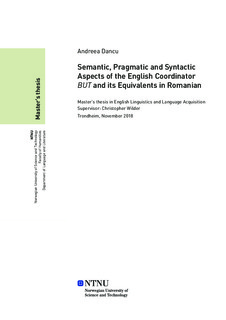| dc.description.abstract | Abstract
The present thesis investigates the semantic, pragmatic and syntactic aspects of the coordinating expression but, in both English and Romanian. But is a linguistic device that semantically has no ‘truth conditional’ value in isolation. According to Saeed (2016: 455), truth-conditional semantics represents “an approach to semantics that holds that knowing the meaning of a sentence is equivalent to knowing the conditions (in the world) under which it could be used to express a true proposition.” When behaving as sentence coordinator, however, but automatically ‘gains’ truth-conditional value as a logical conjunction (the same as and).
Blakemore (1989) claims that since but includes and in its meaning, it falls under the scope of truth-conditional semantics. Yet the fact that but mostly connects statements that express opposite ideas made her admit, similar to Grice (1989), that but means both and and ‘something else’. Grice sees the contrastive nature of but as no ordinary ‘truth-conditional’ meaning and classifies it as a conventional implicature. This basically means that the meaning of the conjunction but must be accounted for within a theory of pragmatics.
Previous literature on English but has suggested three types of meaning: contrast, denial-of-expectation, and correction. While in English the lexical form but is used in all cases, in Romanian there are four different words for it: dar, însă, iar, and ci. This thesis focuses on the claims of Izutsu (2008) according to whom dar and însă are used for denial-of-expectation, iar for contrast, and ci for correction. I will determine the extent to which Izutsu’s (2008) claims are well-founded by comparing her view with that of other authors, such as Zafiu (2005), Bîlbîie & Winterstein (2011), and others.
By means of cross-linguistic evidence I hope to establish the requirements and restrictions that apply to the different meanings of but. For that I present different theories on the meaning of but as well as address two research questions. A major point of interest in the study is the functionality of the Romanian adversative conjunction iar which incorporates both the meaning of and and but. I am interested to find the conditions that cause it to behave as either, and whether there exist exceptional cases. I suggest that the contrast reading allows both iar and dar (but not însă), as long as there exists a two-way, plausible contrast in the clauses, that allows the reversibility of the conjuncts without any implication being cancelled. In a denial-of-expectation reading dar and însă are interchangeable. Iar can trigger a denial-of-expectation reading in non-plausible contrast pair situations only if it introduces a new topic. In such sentences replacement with dar is felicitous. | |
